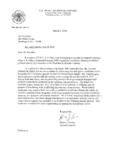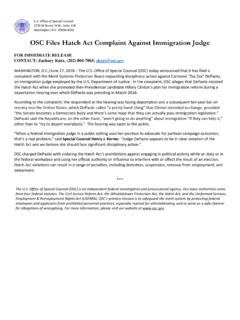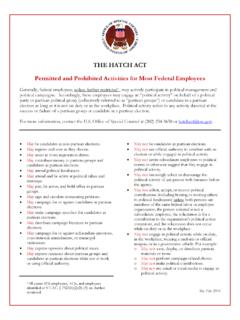Transcription of The U.S. Office of Special Counsel’s Role in Protecting ...
1 The Office of Special Counsel s Role in Protecting Whistleblowers and Serving as a Safe Channel for Government Employees to Disclose Wrongdoing The Honorable Carolyn N. Lerner Special Counsel Office of Special Counsel1 Jason M. Zuckerman Senior Legal Advisor Office of Special Counsel DISCLAIMER: This paper is offered only for educational and informational purposes and does not constitute legal advice, a statement of agency policy or a legal opinion. The material is a summary of the area of law and does not purport to exhaust its subject.
2 The reader can use the outline as a tool for further research, but this paper should not be relied upon or cited in any proceeding, including in litigation before the Merit Systems Protection Board or the Court of Appeals for the Federal Circuit. This paper does not create, and shall not be construed as creating, any right or benefit, substantive or procedural, enforceable at law by any person against the United States, its agencies, its officers or employees, or any other person. 1 The authors acknowledge the assistance of Gregory Giaccio and Grace Williams in preparing this outline.
3 1 TABLE OF CONTENTS I. Establishment of OSC 2 II. OSC s Independence and Powers 3 III. Investigating and Resolving Complaints of Whistleblower Retaliation 4 IV. Obtaining Corrective Action for Whistleblowers 5 V. Pursuing Disciplinary Action 7 VI. Serving as a Secure Channel to Disclose Wrongdoing 9 VII. Scope of OSC Jurisdiction in Whistleblower Retaliation Cases 10 VIII. Prohibitions Against Whistleblower Retaliation 13 A. Whistleblower Retaliation, 2302(b)(8) 13 1. Categories of Protected Disclosures (Element 1) 13 2.
4 Reasonable Belief 16 3. Specificity Requirement 17 4. No Proscribed Channel for whistleblowing 17 5. Perceived whistleblowing 21 6. Exception to Protected Conduct 21 7. Covered Personnel Actions (Element 2) 22 8. Actual or Constructive Knowledge of the Disclosure (Element 3) 24 9. Protected Disclosure was a Contributing Factor (Element 4) 25 10. Agency Burden 26 B. Retaliation for Exercising whistleblowing , Complaint, Appeal or Grievance Rights, 2302 (b)(9) 27 1. Protected Activity (Element 1) 27 2. Cooperating With or Disclosing Information to IG or OSC 32 3.
5 Refusing to Obey Order Requiring a Violation of Law 32 4. Personnel Action and Knowledge (Elements 2 and 3) 33 5. Causal Connection (Element 4) 33 6. Evolving Issues in (b)(9) Cases 35 IX. Procedural Issues 36 A. Three Avenues for MSPB Adjudication of a Whistleblower Claim 36 1. Affirmative Defense in an Otherwise Appealable Action Case 36 2. Individual Right of Action Appeals 36 3. OSC Original Jurisdiction Cases 37 B. Election of Remedies 38 C. OSC Deferral to EEO Process 39 D. Stays 39 E.
6 Legal Representation in OSC Investigations 40 F. OSC Deferral to MSPB Proceedings 40 2 The Office of Special Counsel (OSC) is an independent federal investigative and prosecutorial agency whose primary mission is to safeguard the merit system2 by Protecting federal employees and applicants from prohibited personnel practices (PPPs), especially reprisal for whistleblowing , and provide an independent, secure channel for disclosure and resolution of wrongdoing in federal OSC investigates allegations of reprisal and is authorized to seek corrective action to make a whistleblower whole and to initiate disciplinary action against civilian government officials who commit PPPs.
7 I. Establishment of OSC In the wake of the Watergate scandal, and well-publicized allegations of retaliation by agencies against employees who had blown the whistle on wasteful defense spending and revelations of partisan political coercion in the federal government, Congress enacted sweeping reform of the civil service system in a bill known as the Civil Service Reform Act (CSRA).4 The primary purpose of the CSRA providing review of agencies adverse employment actions was to ensure that [e]mployees are .. protected against arbitrary action, personal favoritism, and from partisan political coercion.
8 S. Rep. No. 95-969, at 19 (1978), reprinted in 1978 2723, 2741. To achieve those goals, Congress identified merit system principles and PPPs designed to ensure, among other things, protection of whistleblowers, open competition for selections and promotions, pay comparability, efficient use of the work force, and fair treatment of government 2 The merit system in federal employment refers to laws and regulations designed to ensure that personnel decisions, including hiring and discipline, are taken based on merit.
9 3 OSC also enforces the Hatch Act provisions on permissible and impermissible political activity by government employees and protects the employment and reemployment rights of military veterans and reservists under the Uniformed Services Employment and Reemployment Rights Act of 1994 (codified at 38 4301 4335). 4 Civil Service Reform Act of 1978 (CSRA), October 13, 1978, Pub. L. No. 95-454, 92; see also Fong, Bruce D., Whistleblower Protection and the Office of Special Counsel: The Development of Reprisal Law in the 1980 s, 40 Rev. 1015, 1017-18 (1991).
10 Stat. 1111-1116. 5 The nine merit system principles are set forth at 5 2301(b): (1) Recruitment should be from qualified individuals from appropriate sources in an endeavor to achieve a work force from all segments of society, and selection and advancement should be determined solely on the basis of relative ability, knowledge, and skills, after fair and open competition which assures that all receive equal opportunity. (2) All employees and applicants for employment should receive fair and equitable treatment in all aspects of personnel management without regard to political affiliation, race, color, religion, national origin, sex, marital status, age, or handicapping condition, and with proper regard for their privacy and constitutional rights.
















